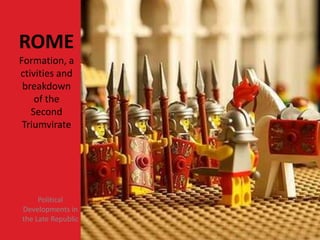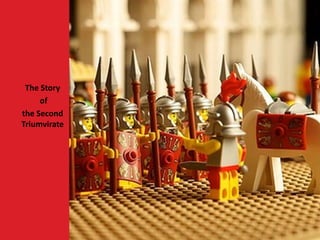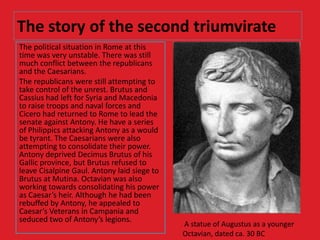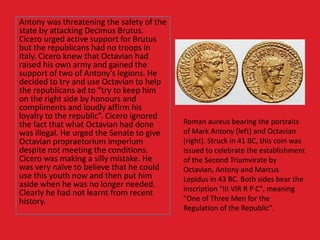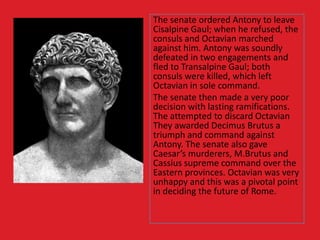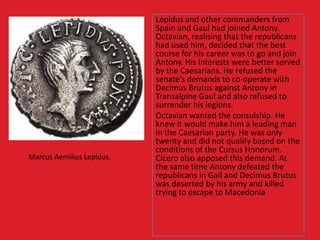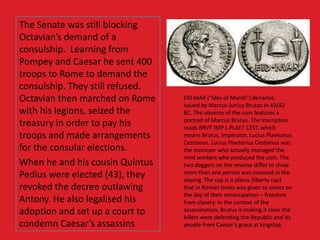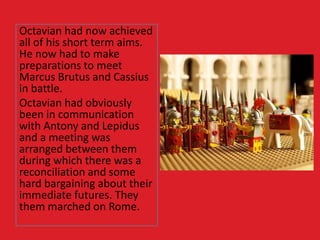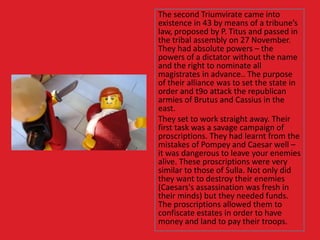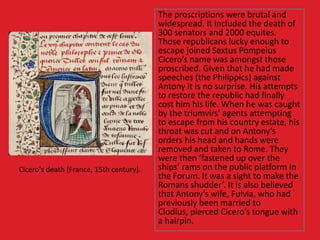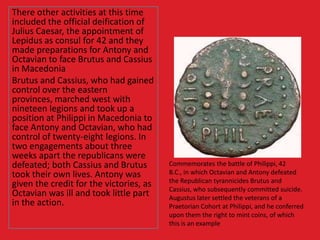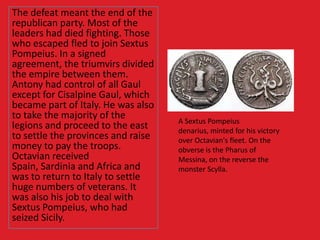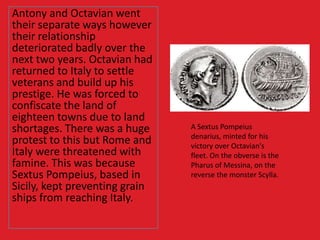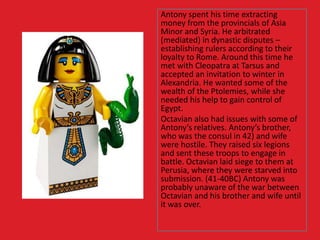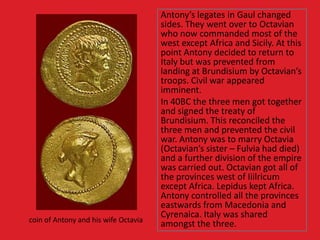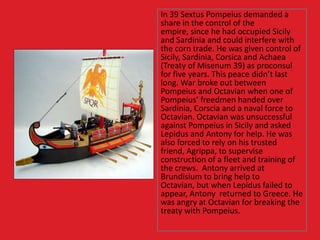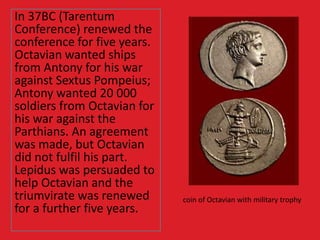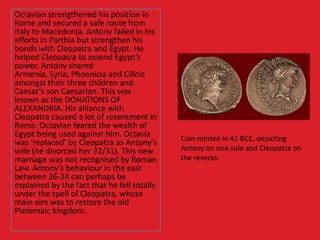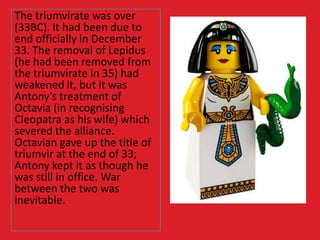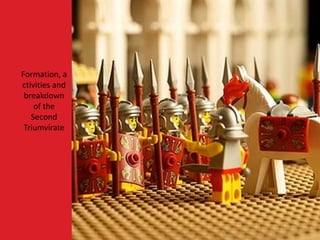Option M (Rome) 3.2
- 1. ROME Formation, a ctivities and breakdown of the Second Triumvirate Political Developments in the Late Republic
- 3. The story of the second triumvirate The political situation in Rome at this time was very unstable. There was still much conflict between the republicans and the Caesarians. The republicans were still attempting to take control of the unrest. Brutus and Cassius had left for Syria and Macedonia to raise troops and naval forces and Cicero had returned to Rome to lead the senate against Antony. He have a series of Philippics attacking Antony as a would be tyrant. The Caesarians were also attempting to consolidate their power. Antony deprived Decimus Brutus of his Gallic province, but Brutus refused to leave Cisalpine Gaul. Antony laid siege to Brutus at Mutina. Octavian was also working towards consolidating his power as Caesarâs heir. Although he had been rebuffed by Antony, he appealed to Caesarâs Veterans in Campania and seduced two of Antonyâs legions. A statue of Augustus as a younger Octavian, dated ca. 30 BC
- 4. Antony was threatening the safety of the state by attacking Decimus Brutus. Cicero urged active support for Brutus but the republicans had no troops in Italy. Cicero knew that Octavian had raised his own army and gained the support of two of Antonyâs legions. He decided to try and use Octavian to help the republicans ad to âtry to keep him on the right side by honours and compliments and loudly affirm his loyalty to the republicâ. Cicero ignored the fact that what Octavian had done was illegal. He urged the Senate to give Octavian propraetorium imperium despite not meeting the conditions. Cicero was making a silly mistake. He was very naÃŊve to believe that he could use this youth now and then put him aside when he was no longer needed. Clearly he had not learnt from recent history. Roman aureus bearing the portraits of Mark Antony (left) and Octavian (right). Struck in 41 BC, this coin was issued to celebrate the establishment of the Second Triumvirate by Octavian, Antony and Marcus Lepidus in 43 BC. Both sides bear the inscription "III VIR R P C", meaning "One of Three Men for the Regulation of the Republic".
- 5. The senate ordered Antony to leave Cisalpine Gaul; when he refused, the consuls and Octavian marched against him. Antony was soundly defeated in two engagements and fled to Transalpine Gaul; both consuls were killed, which left Octavian in sole command. The senate then made a very poor decision with lasting ramifications. The attempted to discard Octavian They awarded Decimus Brutus a triumph and command against Antony. The senate also gave Caesarâs murderers, M.Brutus and Cassius supreme command over the Eastern provinces. Octavian was very unhappy and this was a pivotal point in deciding the future of Rome.
- 6. Lepidus and other commanders from Spain and Gaul had joined Antony. Octavian, realising that the republicans had used him, decided that the best course for his career was to go and join Antony. His interests were better served by the Caesarians. He refused the senateâs demands to co-operate with Decimus Brutus against Antony in Transalpine Gaul and also refused to surrender his legions. Octavian wanted the consulship. He knew it would make him a leading man in the Caesarian party. He was only twenty and did not qualify based on the conditions of the Cursus Honorum. Cicero also apposed this demand. At the same time Antony defeated the republicans in Gail and Decimus Brutus was deserted by his army and killed trying to escape to Macedonia Marcus Aemilius Lepidus.
- 7. The Senate was still blocking Octavianâs demand of a consulship. Learning from Pompey and Caesar he sent 400 troops to Rome to demand the consulship. They still refused. Octavian then marched on Rome with his legions, seized the treasury in order to pay his troops and made arrangements for the consular elections. When he and his cousin Quintus Pedius were elected (43), they revoked the decree outlawing Antony. He also legalised his adoption and set up a court to condemn Caesarâs assassins EID MAR ("Ides of March") denarius, issued by Marcus Junius Brutus in 43/42 BC. The obverse of the coin features a portrait of Marcus Brutus. The inscription reads BRVT IMP L PLAET CEST, which means Brutus, Imperator, Lucius Plaetorius Cestianus. Lucius Plaetorius Cestianus was the moneyer who actually managed the mint workers who produced the coin. The two daggers on the reverse differ to show more than one person was involved in the slaying. The cap is a pileus (liberty cap) that in Roman times was given to slaves on the day of their emancipation â freedom from slavery. In the context of the assassination, Brutus is making it clear the killers were defending the Republic and its people from Caesarâs grasp at kingship.
- 8. Octavian had now achieved all of his short term aims. He now had to make preparations to meet Marcus Brutus and Cassius in battle. Octavian had obviously been in communication with Antony and Lepidus and a meeting was arranged between them during which there was a reconciliation and some hard bargaining about their immediate futures. They them marched on Rome.
- 9. The second Triumvirate came into existence in 43 by means of a tribuneâs law, proposed by P. Titus and passed in the tribal assembly on 27 November. They had absolute powers â the powers of a dictator without the name and the right to nominate all magistrates in advance.. The purpose of their alliance was to set the state in order and t9o attack the republican armies of Brutus and Cassius in the east. They set to work straight away. Their first task was a savage campaign of proscriptions. They had learnt from the mistakes of Pompey and Caesar well â it was dangerous to leave your enemies alive. These proscriptions were very similar to those of Sulla. Not only did they want to destroy their enemies (Caesars's assassination was fresh in their minds) but they needed funds. The proscriptions allowed them to confiscate estates in order to have money and land to pay their troops.
- 10. The proscriptions were brutal and widespread. It included the death of 300 senators and 2000 equites. Those republicans lucky enough to escape joined Sextus Pompeius Ciceroâs name was amongst those proscribed. Given that he had made speeches (the Philippics) against Antony it is no surprise. His attempts to restore the republic had finally cost him his life. When he was caught by the triumvirsâ agents attempting to escape from his country estate, his throat was cut and on Antonyâs orders his head and hands were removed and taken to Rome. They were then âfastened up over the shipsâ rams on the public platform in the Forum. It was a sight to make the Romans shudderâ. It is also believed that Antonyâs wife, Fulvia, who had previously been married to Clodius, pierced Ciceroâs tongue with a hairpin. Cicero's death (France, 15th century).
- 11. There other activities at this time included the official deification of Julius Caesar, the appointment of Lepidus as consul for 42 and they made preparations for Antony and Octavian to face Brutus and Cassius in Macedonia Brutus and Cassius, who had gained control over the eastern provinces, marched west with nineteen legions and took up a position at Philippi in Macedonia to face Antony and Octavian, who had control of twenty-eight legions. In two engagements about three weeks apart the republicans were defeated; both Cassius and Brutus took their own lives. Antony was given the credit for the victories, as Octavian was ill and took little part in the action. Commemorates the battle of Philippi, 42 B.C., in which Octavian and Antony defeated the Republican tyrannicides Brutus and Cassius, who subsequently committed suicide. Augustus later settled the veterans of a Praetorian Cohort at Philippi, and he conferred upon them the right to mint coins, of which this is an example
- 12. The defeat meant the end of the republican party. Most of the leaders had died fighting. Those who escaped fled to join Sextus Pompeius. In a signed agreement, the triumvirs divided the empire between them. Antony had control of all Gaul except for Cisalpine Gaul, which became part of Italy. He was also to take the majority of the legions and proceed to the east to settle the provinces and raise money to pay the troops. Octavian received Spain, Sardinia and Africa and was to return to Italy to settle huge numbers of veterans. It was also his job to deal with Sextus Pompeius, who had seized Sicily. A Sextus Pompeius denarius, minted for his victory over Octavian's fleet. On the obverse is the Pharus of Messina, on the reverse the monster Scylla.
- 13. Antony and Octavian went their separate ways however their relationship deteriorated badly over the next two years. Octavian had returned to Italy to settle veterans and build up his prestige. He was forced to confiscate the land of eighteen towns due to land shortages. There was a huge protest to this but Rome and Italy were threatened with famine. This was because Sextus Pompeius, based in Sicily, kept preventing grain ships from reaching Italy. A Sextus Pompeius denarius, minted for his victory over Octavian's fleet. On the obverse is the Pharus of Messina, on the reverse the monster Scylla.
- 14. Antony spent his time extracting money from the provincials of Asia Minor and Syria. He arbitrated (mediated) in dynastic disputes â establishing rulers according to their loyalty to Rome. Around this time he met with Cleopatra at Tarsus and accepted an invitation to winter in Alexandria. He wanted some of the wealth of the Ptolemies, while she needed his help to gain control of Egypt. Octavian also had issues with some of Antonyâs relatives. Antonyâs brother, who was the consul in 42) and wife were hostile. They raised six legions and sent these troops to engage in battle. Octavian laid siege to them at Perusia, where they were starved into submission. (41-40BC) Antony was probably unaware of the war between Octavian and his brother and wife until it was over.
- 15. Antonyâs legates in Gaul changed sides. They went over to Octavian who now commanded most of the west except Africa and Sicily. At this point Antony decided to return to Italy but was prevented from landing at Brundisium by Octavianâs troops. Civil war appeared imminent. In 40BC the three men got together and signed the treaty of Brundisium. This reconciled the three men and prevented the civil war. Antony was to marry Octavia (Octavianâs sister â Fulvia had died) and a further division of the empire was carried out. Octavian got all of the provinces west of Iiilricum except Africa. Lepidus kept Africa. Antony controlled all the provinces eastwards from Macedonia and Cyrenaica. Italy was shared amongst the three.coin of Antony and his wife Octavia
- 16. In 39 Sextus Pompeius demanded a share in the control of the empire, since he had occupied Sicily and Sardinia and could interfere with the corn trade. He was given control of Sicily, Sardinia, Corsica and Achaea (Treaty of Misenum 39) as proconsul for five years. This peace didnât last long. War broke out between Pompeius and Octavian when one of Pompeiusâ freedmen handed over Sardinia, Corscia and a naval force to Octavian. Octavian was unsuccessful against Pompeius in Sicily and asked Lepidus and Antony for help. He was also forced to rely on his trusted friend, Agrippa, to supervise construction of a fleet and training of the crews. Antony arrived at Brundisium to bring help to Octavian, but when Lepidus failed to appear, Antony returned to Greece. He was angry at Octavian for breaking the treaty with Pompeius.
- 17. In 37BC (Tarentum Conference) renewed the conference for five years. Octavian wanted ships from Antony for his war against Sextus Pompeius; Antony wanted 20 000 soldiers from Octavian for his war against the Parthians. An agreement was made, but Octavian did not fulfil his part. Lepidus was persuaded to help Octavian and the triumvirate was renewed for a further five years. coin of Octavian with military trophy
- 18. Octavian strengthened his position in Rome and secured a safe route from Italy to Macedonia. Antony failed in his efforts in Parthia but strengthen his bonds with Cleopatra and Egypt. He helped Cleopatra to extend Egyptâs power. Antony shared Armenia, Syria, Phoenicia and Cilicia amongst their three children and Caesarâs son Caesarian. This was known as the DONATIONS OF ALEXANDRIA. His alliance with Cleopatra caused a lot of resentment in Rome. Octavian feared the wealth of Egypt being used against him. Octavia was âreplacedâ by Cleopatra as Antonyâs wife (he divorced her 32/31). This new marriage was not recognised by Roman Law. Antonyâs behaviour in the east between 36-34 can perhaps be explained by the fact that he fell totally under the spell of Cleopatra, whose main aim was to restore the old Ptolemaic kingdom. Coin minted in 41 BCE, depicting Antony on one side and Cleopatra on the reverse.
- 19. The triumvirate was over (33BC). It had been due to end officially in December 33. The removal of Lepidus (he had been removed from the triumvirate in 35) had weakened it, but it was Antonyâs treatment of Octavia (in recognising Cleopatra as his wife) which severed the alliance. Octavian gave up the title of triumvir at the end of 33; Antony kept it as though he was still in office. War between the two was inevitable.
- 20. The Legacy of Sulla Formation, a ctivities and breakdown of the Second Triumvirate

